Delos Mythology and History
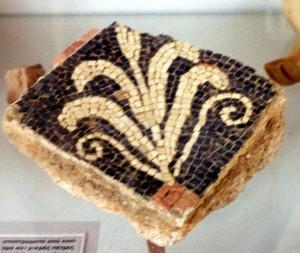
The history of Delos is totally entwined with mythology, as it was the birthplace of Apollo, son of Zeus, and therefore a sacred place. Its position was also fixed in mythology, since before it became Delos (the visible), it was a floating, nomadic rock called Ortygia or Adelos (the invisible). Poseidon anchored the rock in the absolute center of the four points on the compass with regard to its position in the Aegean Sea. It is nearly equidistant to the mainland on the northwest; Chios and Rhodes to the east; Crete to the south; and the Peloponnese to the west. Its geographical position attracted the interest of ancient Greeks, as did other places occupying geometrically important places in their elaborate mathematical approach to Geography, like Delphi. The creation of these myths, given the location of the island, was only a matter of time. Thus, mythology joins with history, as Delos’ geographical position did indeed bring great wealth and riches to Delos, just as Leto, mother of Apollo, had promised. What Leto had not foreseen was calamity and disaster and slavery and loss of human lives that this wealth also attracted, to such an extent that Delos was deserted and remained so in the last two millennia!
The Myth
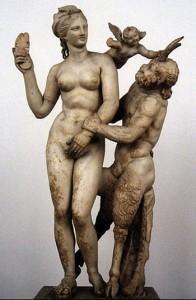 In early mythology, the first reference to Delos began with its appearance as a non-visible rock that floated aimlessly about the sea, formed when Asteria, sister of Leto, was turned into a rock following her pursuit by Zeus. He later pursued and impregnated Leto, resulting in an angry outburst by his wife, Hera, who connived with other gods to prevent Leto from giving birth anywhere in the world and under the sun. And so Leto wandered, yet her time drew closer to the birth.
Zeus appealed to his brother, Poseidon, to help them find some place, somewhere in the sea where Leto could rest and eventually give birth to Zeus’ child. Poseidon then took the invisible floating rock called Adelos [the invisible] and anchored it to the sea with four columns of rock-hard diamond chains and then renamed it Delos [the visible]. This myth was so intensely believed in that it was the reason of peril for many a brave treasure hunters who lost their lives trying to retrieve those diamond chains from the sea bed. Leto promised to Delos that she would make the island the richest in the realm if Delos would allow her to rest here and to give birth to her child, and that the child would never leave the rock. And so it was agreed, and Leto alighted to the Sacred Lake where one palm tree grew at its center. There, Leto, unaided, since Hera had forbidden Eileithuia (From the Greek eleluthuia, which means "the ready-comer"- the Greek goddess of childbirth and midwifery) to assist her, gave birth to twins; the first was Artemis, goddess of the hunt and virginity. Nine days later, she gave birth to Apollo, god of truth and light. It is of interest to note that, according to the Myth, Artemis, a nine-day-old infant, was actually able to assist her mother bring her brother to light; this was possible because Artemis, according to beliefs deriving from the region’s deep prehistory, used to be a Goddess for mammal fertility. In Attica, in Brauron, the Brauronian Artemis was worshipped as the goddess of vegetation and hunting, and as the protector of women in child-birth and of the newborn. She, obviously, had to be reborn to serve her newly assigned role.
From that time onward, Delos became a sacred place, was thus destined to be a place of great wealth, and would always remain bathed in the light of Apollo. One needs to personally witness just how unique this Apollonian light is, to understand. The writer of this article has heard at least five world-renowned painters say that it is the most impressive light they have ever seen!
The History
Delos has had a long and fascinating history that has been traced back to the third millennium B.C. The first inhabitants were presumed to be Carians, as traces of their unique dwellings have been found on Mt. Cynthus. Human habitation resumed a thousand years later with the Mycenaean Period (1580-1200 B.C.), and extensive settlements began to be built. When this world collapsed about 1100 B.C., the Ionians then settled the island, and it became their religious center, remaining so until 540 B.C. when the Athenians took control. 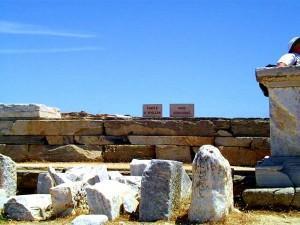 They retained their control over the island, losing it only during the Persian Wars (490-480 B.C.); they re-instituted their control when they founded the first Athenian League, with Delos as their seat and site of the central Treasury. In 456 B.C. the treasury was transferred to the Acropolis, where, it was said, it would be more secure. In 426 B.C., a purification of the island began, and it was decreed that henceforth no one could die or be born on the sacred island. All graves were re-opened and the contents were removed to nearby Rhenia; and this would be where all future deaths and births would occur. A side-effect of this would be that nobody would be Delian by birth, a fact that would facilitate the Athenian control over the island.
The Athenians retained their control until 314 B.C. Under the rule of local leaders, it was declared free and independent and remained so until 250 B.C. when it then came under the control of the Macedonians. It must be noted that throughout the periods between the Athenian and the Macedonian rule, the island had become quite prosperous, and many of its most outstanding monuments had been erected and dedicated to Apollo. It was indeed a religious center and a sacred island. However, when the Macedonians took control, the island then began to flourish as a commercial and trading center, as it enjoyed a perfect location to facilitate trade with Egypt, Syria, and Asia Minor.
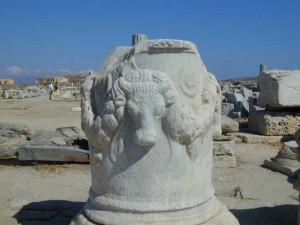
The island continued to enjoy great prosperity, even with several changes of rulers, from Macedonian, to Athenian again, and then to Roman-backed (and controlled) Athenian rule, which was in name only. During this latter period, a major influx of immigration occurred, and Delos enjoyed a most eclectic population. It attracted peoples from all regions of the Mediterranean, as well as Romans, and is believed to have had a population at this time of around 25,000 people. However, from 88 B.C. and until 69 B.C., the island population was decimated when the island was repeatedly attacked and destroyed by Mithridates and his allies, great enemies of the Romans.
From that period on, Delos ceased to be of importance to either the Romans or the Athenians, especially since other ports had begun to open, both in the east and west of the Mediterranean. For all intents and purposes, the island was left to a succession of invaders and pirates who took what they wanted from the island and the small remaining population. 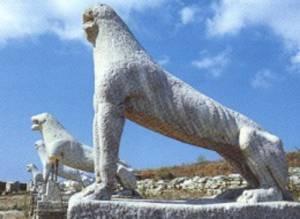 It had brief sparks of interest throughout the early Christian years, but nothing ever took root. Quite a bit of the marble had been ransacked and carted away to be used elsewhere. There was no permanent population on the island from about the 6th century, A.D. Modern excavations began in 1873, and by the early 20th century a great deal of the ancient city had already been revealed. Excavations are still ongoing, and many of the wonderful finds can be seen in situ and in the remarkable indoor Archaeological Museum on the island. The site is quite extraordinary, and there still remains today an aura of reverence about this sacred place.
If you have chosen to visit and explore
Delos, we strongly urge that you do so
with one of our guided tours.
It is the best way to appreciate the
island, and you’ll come away with a
very good insight as to the importance
of Delos in antiquity and of its
contributions to all of mankind. |
|



